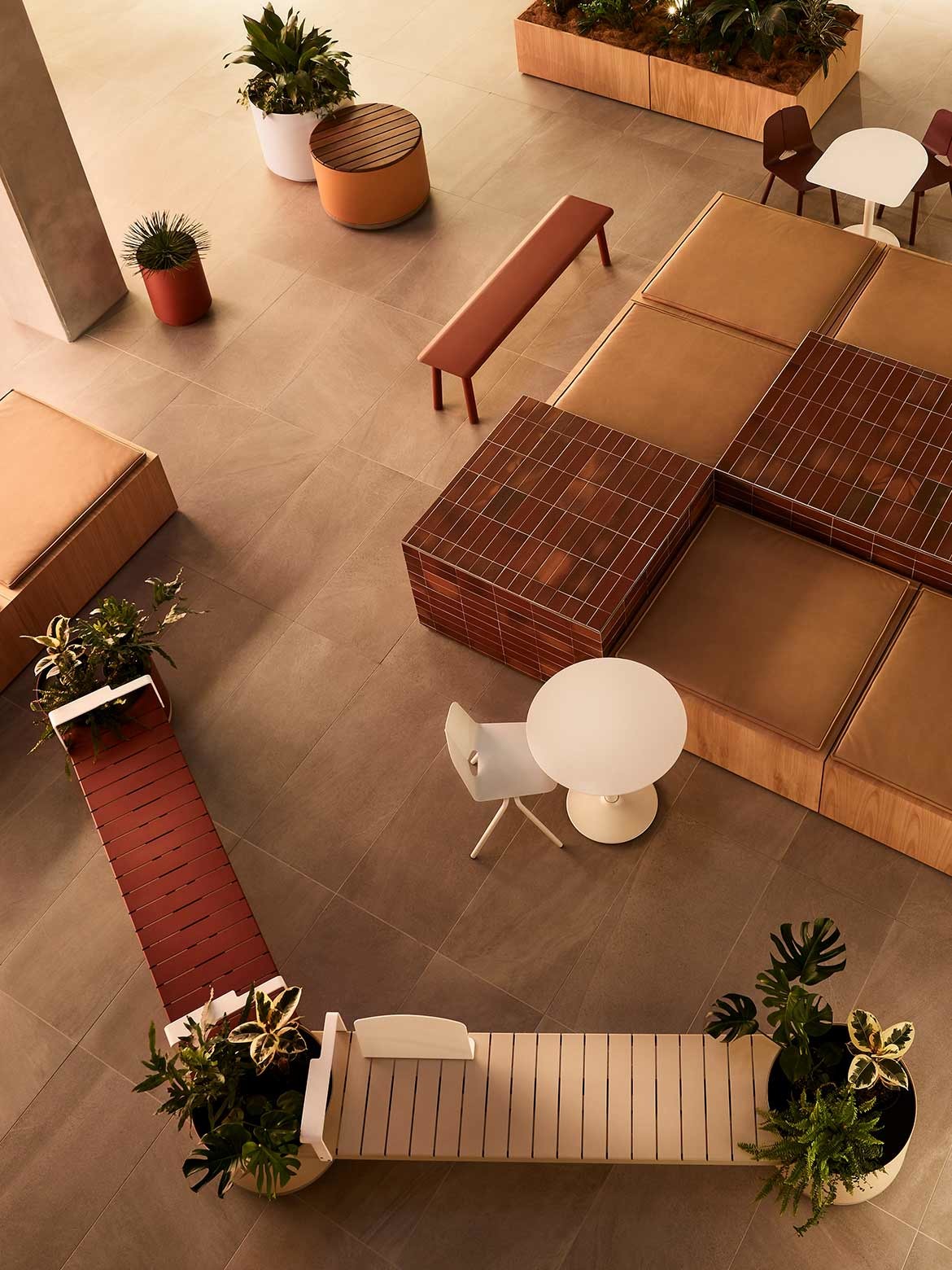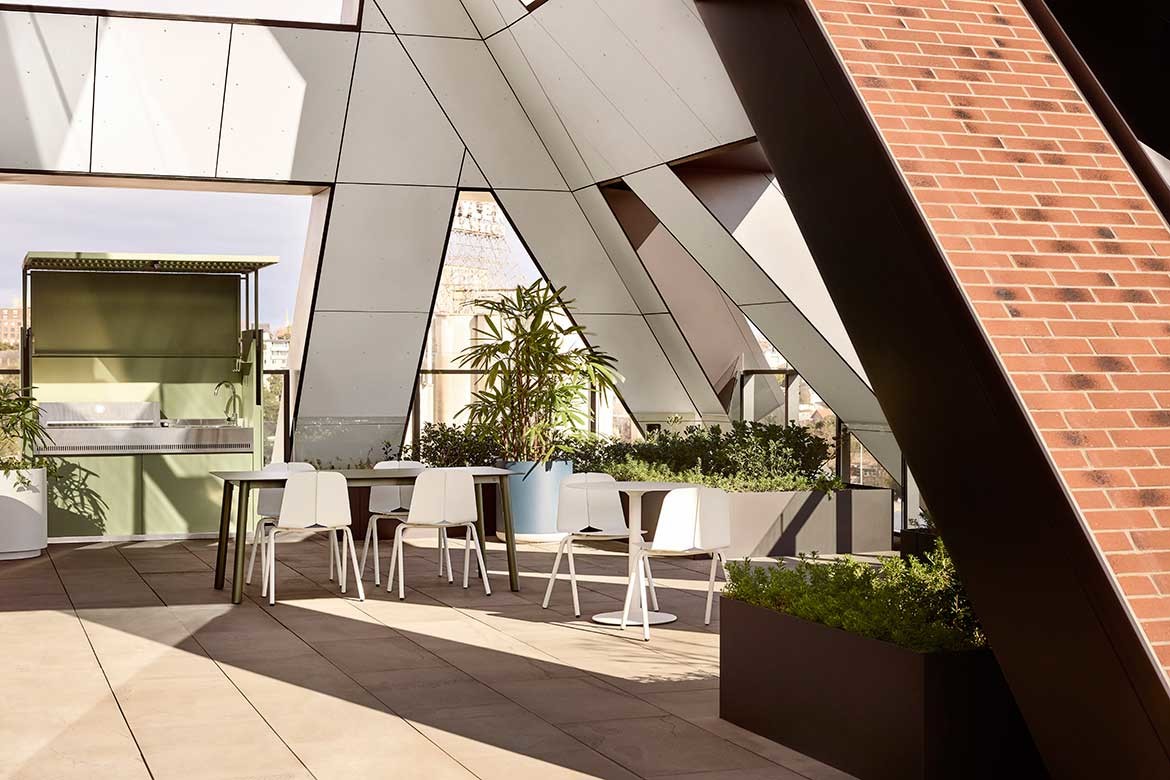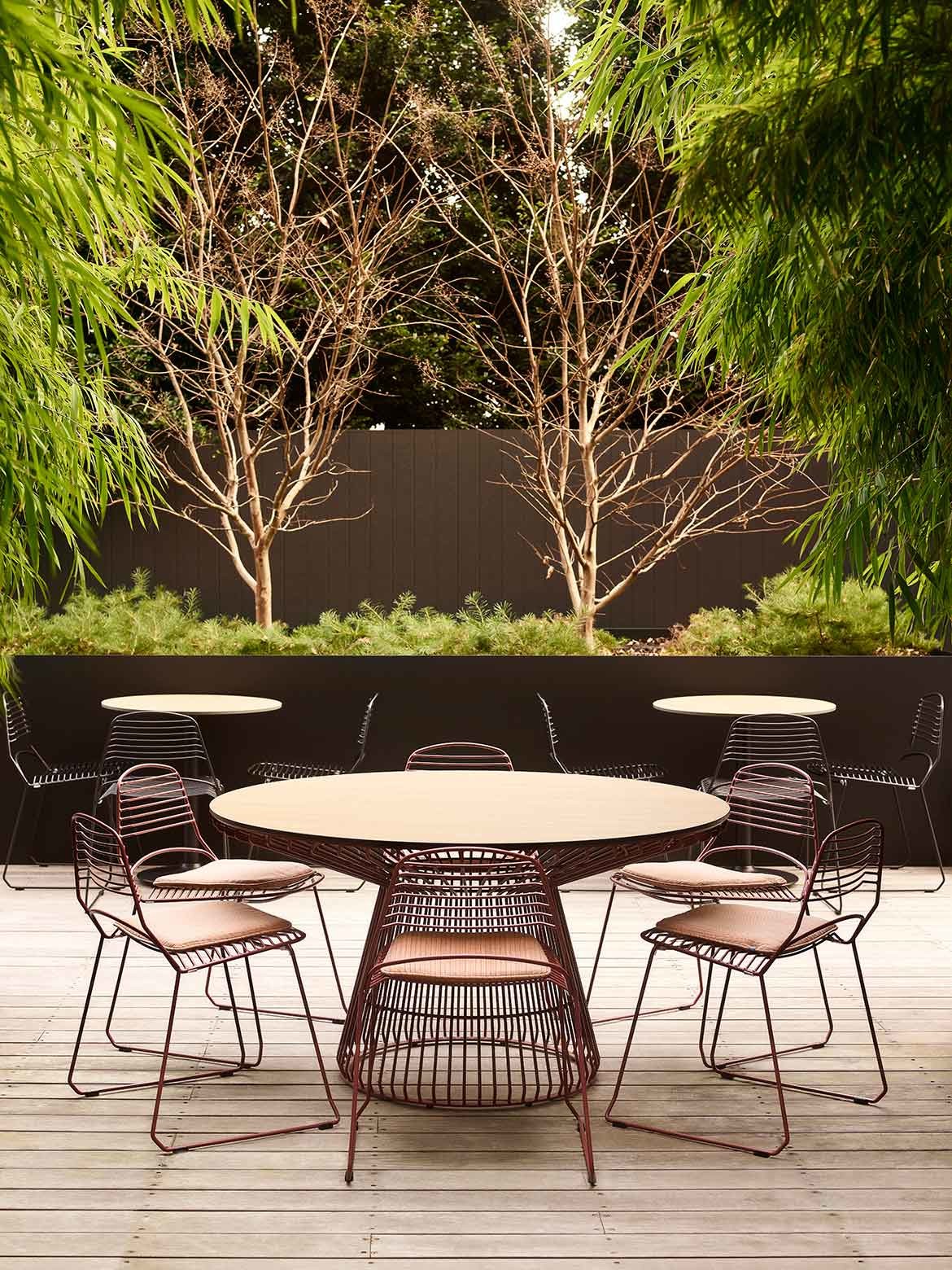Tait’s newest shoot immerses us into a biophilic paradise which can change the way you interact with nature.

September 29th, 2022
The past decade has seen a shift in the way we exist with the world around us. From the rise of plant-core to the emergence of green workplaces, we’re fast realising the benefits of being immersed in environments which are decidedly more ‘green’. Over the last 24 months in particular, we’ve learnt more about the science of nature, as well as the benefits to our health, wellbeing and productivity that can come from spending more time being with and interacting with the natural world.
In office and corporate environments, the increase in biophilia is happily colliding with plans for returning to work. There is increased interest in creating workplaces which are not just human-centric, but nature-centric. We’re seeing a focus on green walls and outdoor terraces, where natural light and air filtration are just as important as uncovering locations which are innately connected to the outside.

When it comes to creating successful indoor/outdoor spaces, Australian brand Tait have long been leading the way. Established in 1992 by husband and wife Gordon and Susan Tait, Tait began in a small factory in Melbourne, Australia and has grown to become an icon of contemporary Australian design.
Tait’s newest commercial shoot draws on their long history of design-led outdoor products and injects it into a corporate setting, providing a blueprint to achieving a biophilic oasis. From terraces to rooftops, lounge areas to bars, Tait’s collection facilitates connection to nature, allowing for escape, relaxation and full immersion.

With a focus on earth-inspired tones and soft, organic shapes, Tait’s shoot provides tableaus that show not only how to work with nature, but how to embody it. Pieces are designed for complete integration – edges are rounded and legs are curved, with lines flowing into each other and textures layered together to replicate nature in its purest form. Silhouettes speak to the elements they will become part of: trees, leaves and rocks, while the more standard of pieces provide the base from which everything else can be built.
Xylem and Scape, both designed by Adam Goodrum for Tait are two collections that seem to have the natural world at their very core. Xylem’s interconnecting skeleton is almost eponymously named for the branch-like vascular tissue in plants that transports nutrients from roots to leaves, while Scape recalls the varied rock masses of Australia’s coastlines.

“I have fond memories as a kid – playing on the elephant-like boulders in the crystalline blue and powdery white sandy coves of Western Australia’s south coast,” says Goodrum. “Scape reminds me of this idea, the wonder of these rock masses and how they’ve been worn and weathered by waves endlessly washing over them.”
Ideal for indoor and outdoor spaces, both collections immediately conjure memories and thoughts of the natural world. Simultaneously playful and practical, the familiarity of the forms encourage interaction, drawing people towards them through nostalgia and curiosity.

Inspired by nature but humanist in practice, Xylem and Scape have connectivity at their heart. For today’s approach to biophilia is not just about health, wellbeing and ecology, but also repairing human connections and creating community. Both collections are intuitively flexible, with different formations and groupings helping to facilitate all kinds of connection points, working as a conduit for building relationships and promoting interactivity.
Drawing on the complex relationships of root systems and plant networks, Xylem’s skeleton allows for infinite additions and endless configurations. Socialisation and collaboration can be encouraged through the creations of clusters or circular setups, while solitude and respite can be found in undulating, snaking shapes or with the additions of armrests, backrests and side tables. Regardless of form and function, Xylem allows for shared central units, providing core connection points even in the quietest of spaces. Like rock formations themselves, Scape is less about systems and more about clusters, with different module types allowing for formations of different kinds. Scape’s rock-like seat is enhanced with powder-coated accessories that appear to grow-off the product’s base. Tables, backrests and side tables support moments of socialising, working, collaborating, meeting, lounging and eating, while extended canopies provide shade and protection while coalescing with nature.

Importantly, both Xylem and Scape – as an extension of Tait’s wider suite of collections – provide nature-inspired design in a multitude of different ways. Whether arranged outdoors to enhance an existing environment, or brought inside with help of inbuilt planters, each unit promotes a considered approach to biophilia.
Imagination is the only limit here, allowing for workplaces to embrace nature no matter the size, shape or location of their office. Rooftop gardens can offer respite with arrangements for groups and individuals, teams can connect over lunch or Friday drinks with indoor spaces elevated with plants, and breakout rooms can promote introspection and collaboration with a unique incorporation of nature.
In spaces like these, the gap between humans and nature is thoughtfully resolved, with Tait and Adam Goodrum focusing on promoting design that facilitates considered, sustainable and healthy relationships: with ourselves, our community and the world around us.
Both the Xylem and Scape collections have been recognised by Good Design Australia; with Xylem receiving the 2022 Australian Good Design Award Winner Accolade and Scape taking home the 2020 Australian Good Design Award Winner, Best in Class.
Start the new year off feeling closer to nature: Tait is proud to extend their guaranteed pre-Christmas delivery order date until 8 October 2022.
We think you might like this story on Xylem by Adam Goodrum, for Tait.
A searchable and comprehensive guide for specifying leading products and their suppliers
Keep up to date with the latest and greatest from our industry BFF's!

BLANCOCULINA-S II Sensor promotes water efficiency and reduces waste, representing a leap forward in faucet technology.

XTRA celebrates the distinctive and unexpected work of Magis in their Singapore showroom.

In this candid interview, the culinary mastermind behind Singapore’s Nouri and Appetite talks about food as an act of human connection that transcends borders and accolades, the crucial role of technology in preserving its unifying power, and finding a kindred spirit in Gaggenau’s reverence for tradition and relentless pursuit of innovation.

In this New Zealand workplace design by Wingates, Anthony Harper were “keen to evolve their working environment as the world evolves as well.”

The global leader in design and innovation, formed from the merger of Herman Miller and Knoll, recently hosted an exclusive event to mark a milestone in its partnership with Pergo.
The internet never sleeps! Here's the stuff you might have missed

Pippins is an architectural response to the land itself, where the boundaries between built form and natural landscape dissolve into one continuous experience.

The design language of this 613-square-metre project by Studio Dashline is raw but refined, a theme that runs throughout the entirety of Ironside.